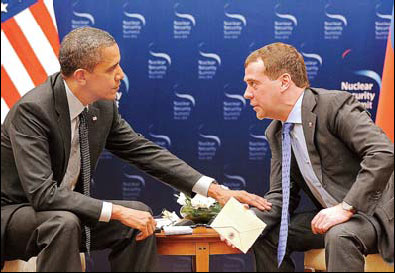Obama vows to pursue nuclear cuts with Russia
 0 Comment(s)
0 Comment(s) Print
Print E-mail China Daily, March 27, 2012
E-mail China Daily, March 27, 2012
US President Barack Obama vowed on Monday to pursue further nuclear arms cuts with Russia, saying the United States has more warheads than necessary, and issued stern warnings to the Democratic People's Republic of Korea and Iran in their nuclear standoffs with the West.
 |
|
US President Barack Obama speaks to Russian President Dmitriy Medvedev during a bilateral meeting in Seoul on Monday on the sidelines of the 2012 Seoul Nuclear Security Summit. [China Daily] |
Speaking ahead of the Nuclear Security Summit in Seoul, Obama held out the prospect of new reductions in the US arsenal as he sought to rally world leaders for additional concrete steps against the threat of nuclear terrorism.
"We can already say with confidence that we have more nuclear weapons than we need," Obama told students at the Republic of Korea's Hankuk University of Foreign Studies.
He pledged a new arms-control push with incoming Russian president Vladimir Putin when they meet in May. But any further reductions would face stiff election-year opposition from Republicans in Congress who already accuse him of weakening America's nuclear deterrent.
Obama laid out his latest strategy against the backdrop of continued nuclear defiance from the DPRK and Iran, twin challenges that have clouded his overall nuclear agenda and the summit in Seoul.
He set expectations high in a 2009 speech in Prague when he declared it was time to seek "a world without nuclear weapons". He acknowledged at the time it was a long-term goal, but his high-flown oratory helped him win the Nobel Peace Prize.
Further reduction
In his speech, Obama said that even after new Strategic Arms Reduction Treaty, signed between the United States and Russia in 2010, the United States will still have more than 1,500 deployed nuclear weapons, and some 5,000 warheads.
"I firmly believe that we can ensure the security of the United States and our allies, maintain a strong deterrent against any threat, and still pursue further reductions in our nuclear arsenal," he said.
Obama said the United States will continue to seek discussions with Russia on reducing not only strategic nuclear warheads, but also tactical weapons and warheads in reserve.
"I'm confident that, working together, we can continue to make progress and reduce our nuclear stockpiles," he added.
Regarding nuclear security, Obama said that the international community has made it harder than ever for terrorists to acquire nuclear materials, but much is still being stored without adequate protection. "The danger of nuclear terrorism remains one of the greatest threats to global security."
For the upcoming Nuclear Security Summit, Obama expected that more tangible and concrete commitments to secure or completely remove nuclear materials will be made by participants.
As for the peaceful use of nuclear power, Obama said, "with rising oil prices and a warming climate, nuclear energy will only become more important. Yet the process of producing nuclear energy also makes it possible for terrorists to reach nuclear weapons. Therefore, improving nuclear security is crucial for the safe use of nuclear energy."
"When we enhance nuclear security, we're in a stronger position to harness safe, clean nuclear energy. When we develop new, safer approaches to nuclear energy, we reduce the risk of nuclear terrorism and proliferation," he said.
In Seoul, Obama made clear that he was committed to that notion, saying "those who deride our vision, who say that ours is an impossible goal that will be forever out of reach", were wrong.
Though Obama was vague on exactly how such a vision would be achieved, he voiced confidence the United States and Russia, which reached a landmark arms-control treaty in 2010, "can continue to make progress and reduce our nuclear stockpiles".
But another arms accord with Moscow will be a tough sell to US conservatives who say Obama has not moved fast enough to modernize the US strategic arsenal, a pledge he made in return for Republican votes that helped ratify the START treaty.






Go to Forum >>0 Comment(s)